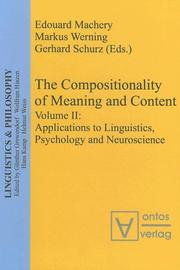| Listing 1 - 7 of 7 |
Sort by
|
Book
ISBN: 3110323583 9783110323580 3868381139 9783868381139 3110323036 9783110323030 9783868381139 9783110323030 1299724310 Year: 2013 Volume: v. 4 Publisher: Berlin Boston
Abstract | Keywords | Export | Availability | Bookmark
 Loading...
Loading...Choose an application
- Reference Manager
- EndNote
- RefWorks (Direct export to RefWorks)
The basic hypothesis of this book is that linguistic reference to kinds should be seen as reference to sortal concepts, i.e. cognitive categories for identifying and classifying objects. Viewed that way, kinds serve as the interface between the conceptual system and the grammatical system. Kind-level predicates differ as to whether they presuppose (e.g. to be extinct) or entail (e.g. to invent) the existence of objects, with crucial consequences for the interpretation of indefinite argument noun phrases. Moreover, object reference always involves underlying kind reference, but kind reference does not always involve object reference. This asymmetry, once recognized, proves useful in solving otherwise puzzling problems in semantic composition.
Semantics (Philosophy) --- Intension (Philosophy) --- Logical semantics --- Semantics (Logic) --- Semeiotics --- Significs --- Syntactics --- Unified science --- Language and languages --- Logic, Symbolic and mathematical --- Logical positivism --- Meaning (Psychology) --- Philosophy, Modern --- Semiotics --- Signs and symbols --- Symbolism --- Analysis (Philosophy) --- Definition (Philosophy)
Digital
ISBN: 9783110323580 9783110323030 Year: 2013 Publisher: Berlin ;; Boston De Gruyter
Abstract | Keywords | Export | Availability | Bookmark
 Loading...
Loading...Choose an application
- Reference Manager
- EndNote
- RefWorks (Direct export to RefWorks)
Digital

ISBN: 9783110938838 9783484305120 Year: 2012 Publisher: Tübingen Max Niemeyer Verlag
Abstract | Keywords | Export | Availability | Bookmark
 Loading...
Loading...Choose an application
- Reference Manager
- EndNote
- RefWorks (Direct export to RefWorks)


ISBN: 3110332868 9783110332865 9783937202532 3937202536 3110332752 9783110332759 3937202536 9783110332759 Year: 2013 Publisher: Berlin Boston
Abstract | Keywords | Export | Availability | Bookmark
 Loading...
Loading...Choose an application
- Reference Manager
- EndNote
- RefWorks (Direct export to RefWorks)
The second volume is devoted to issues of compositionality that arouse in the sciences of language, the investigation of the mind, and the modeling of representational brain functions. How could compositional languages evolve? How many sentences are needed to learn a compositional language? How does compositionality relate to the interpretation of texts, the generation of idioms and metaphors, and the understanding of aberrant expressions? What psychological mechanism underlies the combination of complex concepts? And finally, what neuronal structure can possibly realize a compositional system of mental representations?
Compositionality (Linguistics) --- Linguistics. --- Linguistic science --- Science of language --- Language and languages --- Composition (Linguistics) --- Grammar, Comparative and general --- Semantics --- Hierarchy (Linguistics)
Book

ISBN: 3110515857 3110517876 9783110517873 9783110517880 3110517884 9783110515824 3110515822 9783110515855 9783110515855 Year: 2017 Publisher: Berlin Boston
Abstract | Keywords | Export | Availability | Bookmark
 Loading...
Loading...Choose an application
- Reference Manager
- EndNote
- RefWorks (Direct export to RefWorks)
The present volume offers a selection of papers on current issues in Slavic languages. It takes stock of the past 20 years of linguistic research at the Department of Slavic Studies at Leipzig University. Within these two decades, the scientific writing, teaching, and organization done in this Department strengthened the mode of research in formal description of Slavic languages, formed another center for this kind of linguistic research in the world, and brought about a remarkable amount of scientific output. The authors of this volume are former or present members of the Department of Slavic studies or academic friends. Based on the data from East, West, and South Slavic languages, the papers tackle issues of all grammatical subdisciplines in current models of description, compare parts of the grammars of Slavic languages, explain categories and phrases in Slavic languages that do not exist in present-day Indogermanic languages of Western Europe, and propose ways how to update the standard of lexicography in still less described Slavic languages. A study of language competence is dedicated to the actual requests on heritage speakers and shows how their abilities can be evaluated. The present volume offers a selection of papers on current issues in Slavic languages. It takes stock of the past 20 years of linguistic research at the Department of Slavic Studies at Leipzig University. Within these two decades, the scientific writing, teaching, and organization done in this Department strengthened the mode of research in formal description of Slavic languages, formed another center for this kind of linguistic research in the world, and brought about a remarkable amount of scientific output. The authors of this volume are former or present members of the Department of Slavic studies or academic friends. Based on the data from East, West, and South Slavic languages, the papers tackle issues of all grammatical subdisciplines in current models of description, compare parts of the grammars of Slavic languages, explain categories and phrases in Slavic languages that do not exist in present-day Indogermanic languages of Western Europe, and propose ways how to update the standard of lexicography in still less described Slavic languages. A study of language competence is dedicated to the actual requests on heritage speakers and shows how their abilities can be evaluated.
Linguistics. --- Linguistic science --- Science of language --- Language and languages --- Grammar. --- Slavic Studies.
Digital

ISBN: 9783110332865 9783110332759 Year: 2013 Publisher: Berlin ;; Boston De Gruyter
Abstract | Keywords | Export | Availability | Bookmark
 Loading...
Loading...Choose an application
- Reference Manager
- EndNote
- RefWorks (Direct export to RefWorks)
Digital

ISBN: 9783110517873 9783110515855 9783110515824 Year: 2017 Publisher: Berlin ;; Boston De Gruyter
Abstract | Keywords | Export | Availability | Bookmark
 Loading...
Loading...Choose an application
- Reference Manager
- EndNote
- RefWorks (Direct export to RefWorks)
| Listing 1 - 7 of 7 |
Sort by
|

 Search
Search Feedback
Feedback About UniCat
About UniCat  Help
Help News
News